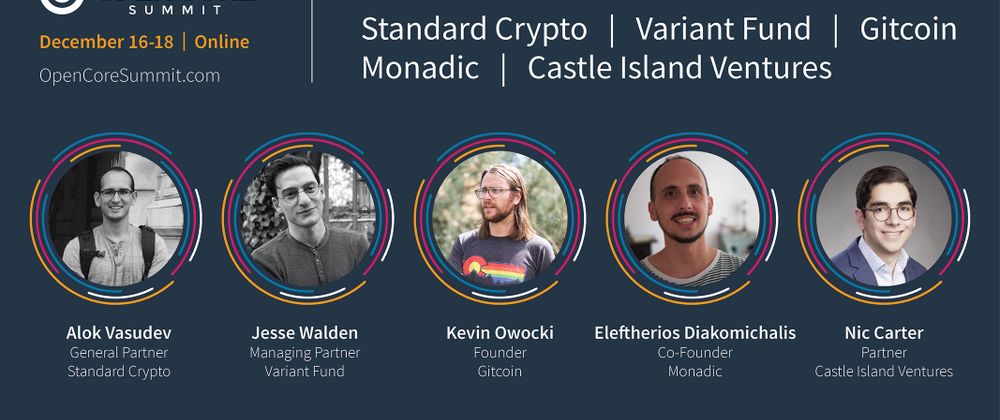Eleftherios Diakomichalis is the co-founder of Monadic.
Relevant Links
LinkedIn - Twitter
Jesse Walden is the founder and managing partner at Variant Fund, an early stage venture firm focused on crypto and platforms building The Ownership Economy.
Relevant Links
LinkedIn - Twitter
Alok Vasudev is a Co-Founder / General Partner at Standard Crypto, a crypto-focused venture capital firm. Prior to Standard Crypto, Alok was VC with Benchmark and S28 Capital. Alok received his PhD in electrical engineering from Stanford University.
Relevant Links
LinkedIn - Twitter
Nic Carter is Partner at Castle Island Ventures.
Relevant Links
LinkedIn - Twitter
Kevin Owocki is the founder of Gitcoin.co -- An blockchain-based network for growing open source software with incentivization mechanics. He has a BS in Computer Science, 10 years of engineering leadership experience in startups and Open Source Software, and is a community organizer in the Boulder Colorado Tech Scene.
Relevant Links
LinkedIn - Twitter
Panel with: Eleftherios Diakomichalis, Jesse Walden, Alok Vasudev, Nic Carter, and Kevin Owocki
JJ gives introduction to panelists and focus of conversation: the intersection of COSS as a type of company, and the crypto/blockchain fundamentals, and the observations that can come from the periphery. -0 :00
Eleftherios (Ele) introduces himself, background, and Radicle - 1:12
Nic introduces himself, Castle Island Ventures, and Coinmetrics - 2:06
Jesse introduces himself and Variant Fund, background in crypto investing with a16z, and founder experience with MediaChainLabs (acquired by Spotify) - 2:43
Alok introduces himself and Standard Crypto, with background at Benchmark Ventures - 3:31
Kevin introduces himself and Gitcoin, and background as a CTO on top of open-source software - 4:08
In your learnings and observations, what is the most misunderstood thing about the open-source paradigm, and the world that we’re starting to see unfold with cryptocurrency and digital money? - 5:14
Nic highlights challenge of replicating open-source governance in the crypto space. What’s different in crypto, is the stakes are much higher in terms of financial value. Also, with regulation, you’re rewarded for being decentralized, which makes command-and-control model (from some open source projects) more difficult in crypto. You can’t simply replicate the things that work in a non-crypto context, into crypto. - 6:37
Jesse shares a 50,000 foot difference: open-source participants are building libraries, which are instantiated somewhere. With crypto networks, they are open source software at the core - you locally run instances - but that local instance isn’t what most people care about. Rather, computers are syncing to form one global canonical instance in crypto. So open-source projects grow by copy-paste, more people creating more instances, and crypto grows by people joining the one canonical network/instance. - 8:37
Alok highlights a key difference in the role of a business buyer. With COSS, it’s expected that business buyer will be the first source of revenue. With crypto, it’s retail, it’s prosumer first, and business adopters come far later in the life cycle. So the key distinction is, who are you creating value for in the early life of a project. - 10:30
Kevin and Ele, the common thing between both of you is that you’re trying to innovate collaboration and codesharing and rewarding developers for creating code. In terms of how you build your businesses, how have you seen the differences? - 11:10
Ele shares thesis that open source has limited value flows, and with Radicle, they’re attempting to enable developers to capture value in ways that weren’t possible before. - 11:37
Kevin shares excitement around the Internet of Money, and the excitement of prototyping at this current “dial-up” stage. Believes open source software is a good place to experiment because there isn’t a good business model around open source software. Creates a large design canvas to explore the space. Gitcoin is starting small, with a bounty for GitHub issues, and a grants product, and finding new ways to provide business models to open-source software. - 12:37
I want to dig into something I think is under-discussed, which is governance. Crypto networks and blockchains are fundamentally open-source projects, built and maintained by a group of software creators. Same is true for COSS. What are the common complexities of evolving technology as it relates to open-source governance? What are the common challenges of coordinating people building open-source projects, which happen to be crypto networks or blockchains, and what do you see is the state of the art for that and how it’s evolving? - 14:53
Nic highlights the common tension between efficiency and legitimacy/credibility/community buy-in. The more you consolidate control, the more you risk alienating stakeholders, and with crypto, many of your stakeholders may be pseudonymous. Highlights inertia of Bitcoin, whereas Ethereum moves much faster - but that fast-moving process leads to the opportunity of capture. Not every last line of code can be as easily vetted. Moving faster creates more opportunity for capture, for example if a corporate would benefit from a certain change. - 16:59
Ele highlights how crypto takes governance and puts it at the center. - 19:59
Alok highlights the role of tokens in crypto in creating decisions and questions around governance. Also highlights the spectrum in which governance can be a liability or be an advantage. - 20:52
Jesse shares perspective that crypto networks which seem to maximize governance have low voter turnout. Hypothesis: crypto networks that want to have a dynamic governance system, end up taking on a hierarchical decision-making framework that looks close to corporate governance or how open-source projects are maintained. While crypto started as very decentralized, crypto networks that require a lot of subjective input may end up having a more familiar governance structure. - 22:33
JJ: I’m curious about something that’s a heated topic of discussion - licensing discussions. I don’t see any discussion of licensing in the crypto world. In the crypto world, do the licensing decisions actually affect governance in any way? If so, why? And if not, why? - 24:30
Alok shares perspective. Licenses are often needed for interacting with business buyers, and since crypto has less of that, it’s less important. Also the idea of having a canonical instance with a network effect and building momentum on its own. Where licenses enter into crypto, is often open-source projects in crypto that may need a COSS-style business model. For example, MetaMask, and their recent controversial licensing discussion. - 27:03
Ele talks about licenses as a coordination mechanism. In crypto, this is not such a concern anymore, but the same concern moves to token distribution and governance. Discussion about “fair launches.” - 29:10
Nic highlights that it’s a business model question, and the business model in crypto networks has more to do with token dynamics, distribution, potential appreciations. Tokens monetize the protocol, so it often comes down to how tokens are distributed. Also highlights trademarks. There are trademarks in the crypto space - and it exists as a nuclear option. - 30:10
JJ: I wanted to ask about the mutability of license changes in crypto networks. Has there been any evolution in the open-source licenses serving as the basis for crypto networks? Does it matter if those things change? - 32:25
Ele remembers conversation from 2017 around an open-source blockchain being concerned that another vendor would copy their stuff and sell it as a private blockchain to customers, but acknowledges this is very rare. - 34:230
Jesse: In the crypto world, the license is a legacy thing that nobody cares about. In the crypto world, the code is the contract. The code is law and licensing doesn’t play much of a role, except for edge cases. - 35:15
Nic gives example of the names of developers attached to the Bitcoin core client. Names of the maintainers has changed over time. This caused controversy, cause it implies the maintainers named are the administrators or those in charge, and it became political who was named in the software - who are the Bitcoin core maintainers who have access to the GitHub repo. - 36:30
JJ: On the topic of the degree to which something is decentralized, I think back to Vitalik’s piece on [Quantifying Decentralization]. What are the most challenging areas in the crypto world where decentralization is important, but it’s still a pipe dream today? - 38:05
Nic: The actual development of the protocol is a great example. Often described as a meritocracy, but developers operate at an elite level, and it’s often hard to break into that. In practice, it tends to be a technocracy. - 39:13
Kevin: The area that we have higher aspirations than progress is ownership distribution. Token distribution and governance and voter turnout is low, because governance is just a whale game. References the [Matthew Effect], an economic law stipulating that a closed economic system will trend towards oligarchy over time, which is the compounding effect of accumulated gains. How do we reverse the Matthew Effect? One area of research to that end is Quadratic Voting, which gives the little person more sway relative to the whales. - 39:59
Alok speaks about the difficulty and accessibility of contributing to the codebase. Smart contracts seem more accessible. - 41:45
Jesse highlights the ownership distribution. Crypto networks often distribute ownership to users, who use the protocol. With that, there’s an opportunity to measure the contribution of each user individually and meritocratically distribute value to them. If it can be done effectively, you have a more decentralized network from the user perspective. Also highlights user recourses, including forkings (e.g. creating a new canonical instance - rare but has happened). Also, users can pool resources together and coordinate, and that can enable them to be a stronger force in governance. - 42:45
JJ: Something that’s starting to happen in startup investing, and what we’re doing at OSS Capital, is to carve out an allocation in the round for the community. Crowdsource fundraising is now legal. How can we improve the state of the art in traditional equities and fiat private equity investing as it relates to creating an allocation for the crowdsourced community on the cap table? - 45:00
Jesse: The opportunity for the community to own is generally associated with earning rather than investing. - 47:00
Nic: One simple answer is tokenize the equity. You can compliantly tokenize the equity, then tie those transfers linking to investment or work done. - 47:55
JJ highlights Gumroad example in response, and concluding remarks. - 48:45
Share your questions and comments below!



Top comments (0)